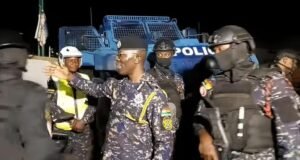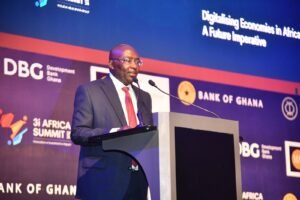
Some Members of the NDC Hawks
The Vigilante at Work and His Fate to Political Fortunes
By Kenneth Agyei Kuranchie, Publisher
One of my favourite dictionaries, the Merriam Webster, defines the word ‘vigilante’ as ‘a member of a group of volunteers who are not police but who decide on their own to stop crime and punish criminals’.
A vigilante, therefore, is not necessarily a bad person. He is a volunteer, who tries to assist the police to stop crime and punish criminals. In modern policing and crime prevention as well as adjudication, it is normally preferred that the fight against crime is left strictly to the appropriate law enforcement agencies, that is the police and the judiciary.
So that, even though the vigilante may not fall under the approval of current and modern thought on what is the acceptable means of fighting crime, he is not necessarily a bad person.
I am saying that by extension, the word ‘vigilante’ as we have come to understand it under current Ghanaian lexicon, may not be synonymous with its pristine, dictionary definition. Along the way, at least in Ghana, it lost some of its proprietary use and has assumed a more negative connotation.
The reasons for this may be due in large measure to the historical etymology of the development of the image of vigilantism in Ghana. What I mean by this long string of words is that vigilantism developed in Ghana because politicians decided that they needed volunteers to protect their ballots during electioneering campaigns. When ballots had already been cast, but the party that was being battled was the party in power which had control of the police, the military and the immigration and other law enforcement agencies, one needed a crop of people, who would put their lives on the line to protect the ballot until it is counted, so that the will of the people will be known. Hence, vigilante.
Again, this is not necessarily a bad activity; in fact, it is patriotic to take a stand and say that you will not allow the will of the people to be subverted. So far, so good.
You would realize, from the initial definition of the word ‘vigilante’ that I used, that the vigilante is a ‘volunteer’. Now, a volunteer is a person who ‘voluntarily undertakes to do something’. He does not work for pay; for instance, he would not put his life on the line at the polling station for any pecuniary reward or hope of any pecuniary reward. He does what he does because he believes it to be right. He may not do what he does lawfully, in fact, he may act in direct contradiction to the law, but he believes in the right of what he does. He may be anything, but one thing that he is not, is a mercenary.
As a volunteer, the vigilante, by and large, is also not organized. He is not part of an army, covert or overt. He acts, by and large, almost alone, or in small, disorganized groups. And once that work is done, he expects to disappear into the woods, never to be seen again, and most unholy, to claim his rewards, even if justified.
And it is not practical to keep an organized body of men and women for the sake of electioneering purposes. The reasons are simple, really. Doing a simple, rough and ready calculation, if a man decides to maintain a body of ten men, paying them two hundred Ghana cedis a month, he would pay about twenty-four thousand Ghana cedis a year in salaries. Ghana, if I recall, has over twenty-one thousand polling stations. If a person or institution were to keep a body of men numbering twenty-one thousand on payroll at two hundred Ghana cedis apiece, over a period of four years, that man or that institution would pay over two hundred million Ghana cedis, just for payroll. We are not talking of other logistical needs such as training, transport, accommodation and other factors that would come into play. And you have to also remember to make any real and meaningful change, each polling station would need at least five such men. Over eighty thousand men. Who has the finances and logistics to maintain such number of men in Ghana? I will wager that not even the government of Ghana.
You have to remember at the outset that two hundred cedis is a woefully inadequate sum of money to pay any strapping young man. He is likely to turn on you for paying him such peanuts. Indeed, if two hundred Ghana cedis a month is all that you can afford to pay the strapping young man, you would be wise to avoid his company.
Which leads me to Ghana’s version of the vigilante, the guy with the negative image. Is this guy really for real? From the foregoing, if to win elections using vigilantes you need eighty-five thousand young men, then it is really not true that any such group of men were kept for electioneering purposes.
When I ask the question whether the vigilante is for real, therefore, I am not asking whether the one you saw on television, lacks his masculine features or the bulky muscles that he needs to beat the hell out of me; he does. I have no doubt that he does. But muscles aside, does he really have all the attributes made to him? Is it really true that he battled the demons and monsters of hell to bring whichever political party to power, and is therefore deserving of all that the political party and the state has to bestow upon him? And is he going to do so again, such that political party leadership should depend upon him?
If, as I have stated, because of sheer logistical nightmare that he would constitute, this Ghanaian vigilante was never organized on any really large scale to make the difference, then to what do we owe him our obeisance?
Or, is the vigilante a creature of men of mirrors, magicians, as it were, who would create the image of being captains of groups of strong men, so that when it comes to sharing the spoils of war, these magicians would be so recognized?
I think the vigilante menace problem we have in Ghana may have a lot to do with the men of mirrors and magicians of the latter. They are building whole political empires trading in smoke and mirrors, claiming credit for vast armies that do not exist. I speak of the Joseph Yamins of our politics. Unfortunately, in all their scheming, things also often have a way of getting out of hand; individuals with very violent proclivities, who do not realize that a game of mirrors is being played, that what is sought to be portrayed is not strength but a look of strength, get involved, get overboard, and people end up getting killed. Or property destroyed.
Thus, Ghana’s version of the vigilante.
Of course, when I talk of the vigilante, what comes to mind is a strapping young man, with huge muscles and off-putting physical features. You certainly do not think of the meek looking old gentleman with bifocals sitting in your radio studio, who justifies anything and everything so long as it comes from one end of the political divide, and will oppose anything and everything so long as it comes from the other side of the political divide; no, you would not look upon this meek looking person as a vigilante (Ghana version) but he may, in reality, be worse than the muscle-bound young man. The muscle-bound young man would need to strain himself very much to beat five men in a day, not to speak of killing them. The old gentleman in your radio studio poisons thousands of minds and souls every day with his talk. He is a worse vigilante, with no right to condemn the young man.
In a way, the man in the studio, who has tied his personal fortunes to political systems, and would do anything and everything to push that agenda, is vastly more dangerous to Ghana. He may be more dangerous than the Yamins of our politics.
Then, I get to those who think that they will profit from the antics of the Yamins, vigilantes and pontificators of our politics.
The Bible says that the house that is built on sand is not built on proper foundations. If you depend on an army that does not exist, you depend on no army. It is just wind, smoke and mirrors. If you wait to count on a vigilante to defend your cause when you have not cultivated him, you are depending on nothing. And the windbags in the studio with the nihilistic attitudes who will see nothing progressive or positive in the other side, will not make us our fortune. Because they are also sand.
What will make us our political fortunes, what would determine our fate, is our message to the people. And by message, I do not mean the prattle that goes for radio commentary or the big speeches, but real action, that brings meaningful and qualitative change, in the lives of the people, at all levels, from the market places, farm gates and university dormitories.
It, most certainly, will not be decided by vigilantes.








